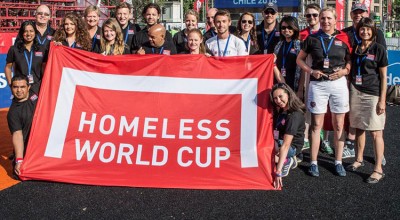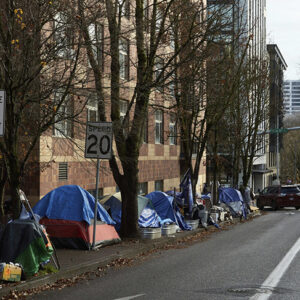 Late last month, the 12th annual Homeless World Cup games took place in Santiago, Chile, where hundreds of homeless athletes from over 70 different countries played soccer in a professional setting, to improve their skills, and help them build the confidence that they need to get back on their feet.
Late last month, the 12th annual Homeless World Cup games took place in Santiago, Chile, where hundreds of homeless athletes from over 70 different countries played soccer in a professional setting, to improve their skills, and help them build the confidence that they need to get back on their feet.
The Homeless World Cup was founded by Mel Young from Scotland and Harald Schmied from Austria in 2001, and became a reality just two years later, in 2003.
In a speech before the games began this year, Mel Young told the audience that, “The world today for many, many people is not a good place. We have created a cruel world where many people are excluded. This is not sustainable. Too many people live frightened lives trying to scratch a living in the dark. We have to move these people to the light.
The organizers of the games like to follow up with the players after the event, to see if it made any impact on their lives. According to surveys that the group gives to players six months after the event, over 90% of the players who participated in the games found a new motivation in their lives, even if that motivation had nothing to do with sports. In fact, most of the improvements that the players had made, didn’t have anything to do with sports at all.
After the games, many of the players were able to make quick progress getting back on their feet by finding employment and steady housing.
According to the Homeless World Cup website:
Today, the main role of the organization is to coordinate the work of its 70 national partners by providing support and guidance in football and management skills, to help grow and develop sustainable programs which have a positive impact on the lives of homeless and excluded people all around the world.
At the annual Homeless World Cup tournament, the national partners come together to demonstrate how football has the power to change people’s lives. The tournament also celebrates the year-round work of the organization and creates an opportunity for players to represent their country and meet and build relationships with homeless people from other countries. It also lights up the hearts and minds of everyone it touches and changes people’s attitudes to homelessness – in all cities where the tournament is held, people who are homeless report improved relations with the public.
A number of players from the Homeless World Cup events actually have went on to play professionally, including, Michelle Da Silva, David Duke, Parick Mbeu and Ginan Koesmayadi.


